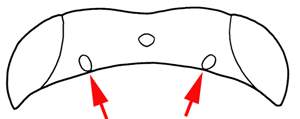Author, year, journal with original description
Ashmead, W.H., 1904, Memoirs of the Carnegie Museum, 1:343, 510
Type species
Paracrias laticeps Ashmead (lectotype female in the United States National Museum of Natural History, Washington, D.C)
Synonym names
Emersonopsis Girault, Euplectrentedon Girault
Diagnosis
Head lenticular with upper occiput concave so that posterior ocelli is very close to or touching occipital margin; pronotum without transverse carina; propodeum with median carina (median carina smooth or more or less covered with reticulation)and with reticulate submedian grooves; scutellum without median groove; forewing usually with continuous submarginal and marginal veins, i.e. without a break between these two veins
Number of species
57, Gumovsky (2001) described six new species of Paracrias which are not included here because the descriptions do not include most of the characters used in the key to Paracrias on this website
Distribution
Nearctic and Neotropical regions, with the main distribution in the Neotropical region
Biology
Parasitoids on weevil larvae (Coleoptera: Curculionidae) in seeds or buds
Literature
Ashmead, W.H., 1904. Classification of the chalcid flies. Memoirs of the Carnegie Museum, 1:225-551
Schauff, M.E. 1985. The New World genus Paracrias Ashmead (Hymenoptera: Eulophidae). Proceedings of the Entomological Society of Washington, 87:98-109
Gumovsky, A. 2001. Review of the genus Paracrias (Hymenoptera, Eulophidae, Entedoninae). Vestnik Zoologii, 35:9-26
Hansson, C. 2002. Eulophidae of Costa Rica, 1. Memoirs of the American Entomological Institute, 67:1-290 (Paracrias is treated on pp. 85-143)









